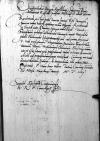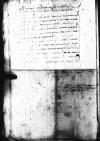⌊Sigismundus⌋ Dei gratia rex ⌊Poloniae⌋, supremus dux ⌊Lituaniae⌋, ⌊Russiae⌋, ⌊Prussiae⌋, ⌊Masoviae⌋ etc. dominus et heres
Reverendo in Christo Patri, domino ⌊Ioanni episcopo Varmiensi⌋ sincere nobis dilecto gratiam nostram regiam.
Reverende in Christo Pater et Domine, sincere nobis dilecte.
Vacat praepositura ecclesiae cathedralis Varmiensis morte venerabilis ⌊Pauli Plothowski⌋, iuris patronatus nostri. Ad quam duximus Paternitati Vestrae praesentandum venerabilem ⌊Ioannem Benedictum⌋, Varmiensem, Vilnensem, Vratislaviensem canonicum, physicum nostrum, ita ut hisce litteris nostris praesentamus, volentes, ut eum et neminem alium ad praeposituram hanc investiat curamque animarum, administrationem specialium et temporalium illi committat.
Cupimus Paternitatem Vestram bene valere.
Datum ⌊Cracoviae⌋, secunda die mensis Mai, anno Domini M-o D-o XLVII-o.
⌊Samuel episcopus Cracoviensis⌋ et ⌊regni Poloniae⌋ cancellarius scripsit

